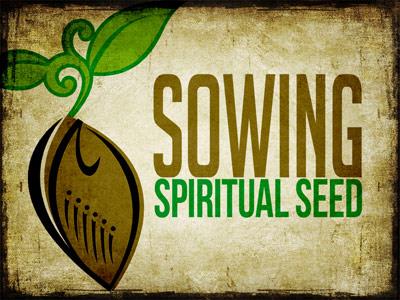-
The Wheat And The Weeds Series
Contributed by Alan Mccann on Jan 18, 2007 (message contributor)
Summary: It is difficult to tell wheat from weeds at times, but come harvest they will be separated to eternal destinies
The Parable of the Weeds
Matthew 13.24-30; 36-43
This is an MP3/4 player. I bought it off Ebay. From a distance it looks like an IPod nano, but it is not a nano. It looks like a nano, has many of the same functions as a nano but it is not a nano. It is a very good copy. It is deliberately designed to look like a nano. I am sure you have seen many such things. In fact lots of supermarket own brands are deliberately packaged like a similar branded product. Why? Part of it is because we associate quality with the branded products but we are happy to buy the cheaper products – it is all about image/illusion and believe it or not ‘guilt.’ Counterfeiting is big business today – but isn’t it interesting that no one ever counterfeits that which is cheap. It is always something of value that is counterfeited. It is a deliberate attempt to deceive people. You know when they are training people to spot the counterfeit, say in money, they never show them counterfeits at the beginning. They actually spend the majority of the time looking at the real things so that they become so familiar with it that they are enabled to spot that which is not authentic. In the parable which Christ told in Matthew 13, the parable of the Weeds, there is some counterfeiting going on. Turn with me to Matthew 13 and let us look at this parable.
Once again Jesus is speaking to the crowd and once again the explanation of the parable is given only to the disciples a little later. Jesus continues to use agricultural imagery to tell this parable. Once again it is about seed, only this time there are two types of seed sown and there are two sowers.
Verse 24 Jesus begins the parable by speaking of a man who goes out to sow seed on a field. From verse 38 we know that the field is the world. Jesus is saying ‘this is what it is like when God is at work.’
Verses 25-30 but all is not well in the field. Whilst they sleep (and this is not meant as a criticism of them but showing the deceptive nature of the enemy) an ‘enemy’ comes and sows weeds amongst the wheat. The weed sown is probably darnel, closely related to wheat but poisonous. In fact until both plants are fully grown and the ears of wheat appear they are virtually indistinguishable from one another. At the time of Christ to sow darnel amongst wheat was a serious crime and punishable under Roman law – so we can see that those listening to Christ would have been familiar with such an occurrence. If there were only a light infestation of darnel then careful weeding would be possible but not without the possibility of damaging wheat. If the infestation was heavy then it would be virtually impossible to separate them as the roots of darnel would mingle with those of the wheat and as it was uprooted so would the wheat with disastrous consequences. The servants are all for pulling up the weeds but the owner is much more patient and much more aware of the damage that such action could do to the precious wheat (v29). He is quite prepared to wait till harvest to do the separation. At harvest time when the ears of wheat are full grown then distinguishing wheat from weeds is easy and so the harvesters are instructed to first remove the weeds (v30). The weeds are fit for nothing but to be tied in bundles and thrown into the furnace to be burnt. Then, and only then, can the wheat be safely gathered into the barn of the owner.
Verse 36 Jesus leaves the crowd and goes into a house and the disciples follow him. They ask for an explanation of the parable of the weeds. And in the following verses all is explained to them.
Verses 37-40 the explanation. In verse 37 Jesus tells them that the man who sowed the good seed is the Son of Man – which is a biblical title given to the Messiah and which Christ applied to Himself. He is the one who both sows the seeds and directs the harvest, at the appropriate time. We also see from verse 37 that the wheat represents believers who are sown by Christ in this world. They owe their position in the kingdom of God entirely to Christ, it is nothing of their own initiative but all of his grace. In verse 43 we read that they are the sons of righteousness in their standing before God and in their behaviour in the world. Because they are adopted into the kingdom of God they are enabled to call God ‘Father.’ Finally in verse 43 Jesus tells his disciples that the wheat will shine with the glory of God on that final day. The glory of God will be reflected in and from them on the day of judgement.

 Sermon Central
Sermon Central



